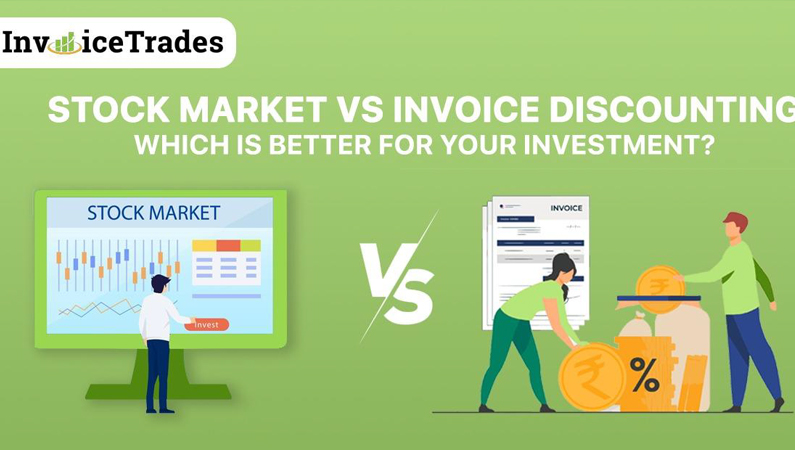
When it comes to making smart financial decisions, choosing the right investment vehicle is crucial. With a variety of options available, investors often find themselves debating between traditional investments like the stock market vs invoice discounting, a lesser-known but increasingly popular alternative. Both have their unique pros and cons, but which one is better for your financial goals?
Choosing between the stock market vs invoice discounting can be a challenging decision for investors. While the stock market has been a go-to option for decades, invoice discounting is emerging as a viable alternative for those seeking predictable returns with lower risk. In this blog, we'll compare both options in detail to help you understand which investment suits your needs best.
The stock market is a platform where individuals and institutions can buy and sell shares of publicly listed companies. It's a well-known investment avenue that offers opportunities for high returns but comes with significant risks.
Pros of Investing in the Stock Market:
Cons of Investing in the Stock Market:
In terms of risk and volatility, the stock market vs invoice discounting comparison clearly shows that stocks carry higher risk but also offer higher rewards.
It’s a form of short-term borrowing where companies get immediate cash flow without waiting for clients to pay their dues.
How Invoice Discounting Works:
Benefits of Invoice Discounting for Investors:
When comparing stock market vs invoice discounting, invoice discounting offers more stability and predictability in returns.
Returns are a critical factor when choosing an investment. Let's compare the potential returns of stock market vs invoice discounting.
Stock Market Returns:
Invoice Discounting Returns:
For investors seeking consistent returns with lower risk, invoice discounting may be a better option compared to the stock market.
Understanding the risks involved is essential when comparing the stock market vs invoice discounting.
Risks in the Stock Market:
Risks in Invoice Discounting:
Overall, stock market vs invoice discounting shows that invoice discounting carries lower risk, especially for risk-averse investors.
Stock Market Liquidity:
Invoice Discounting Liquidity:
When comparing stock market vs invoice discounting, invoice discounting provides quicker access to funds with less market dependency.
Who Should Invest in the Stock Market?
Who Should Consider Invoice Discounting?
In the debate of stock market vs invoice discounting, the latter is more suitable for conservative investors and businesses.
Understanding the tax implications is crucial when comparing stock market vs invoice discounting.
Stock Market Taxation:
Invoice Discounting Taxation:
When comparing stock market vs invoice discounting, the tax burden may be lower for invoice discounting investors depending on the tax slab.
Stock Market Outlook:
Invoice Discounting Outlook:
The future of stock market vs invoice discounting suggests that both options will coexist, catering to different types of investors.
When it comes to choosing between the stock market vs invoice discounting, the right choice depends on your risk appetite and financial goals. The stock market offers higher long-term returns but comes with greater risk and volatility. On the other hand, invoice discounting provides predictable, stable returns with lower risk.